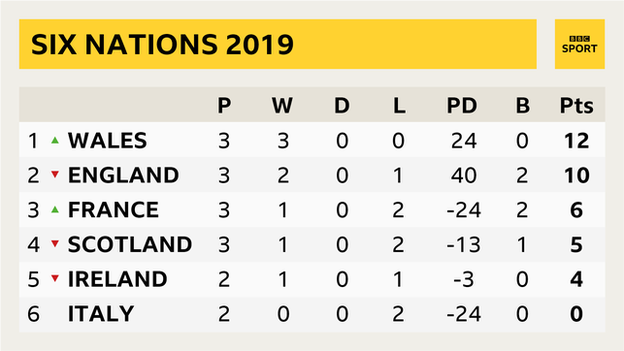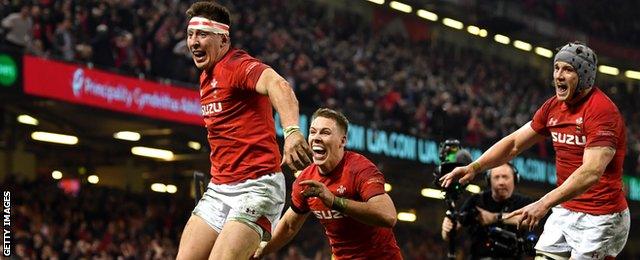Wales 21-13 England: Warren Gatland masterminds famous win in Cardiff
- Published
Six Nations: Wales come back to stun England 21-13
These are days of magic numbers for Wales and a chasteningly familiar zero-sum game for England.
A 21-13 scoreline; a killer try after 34 phases, 12 Test wins on the bounce; Welsh wins over England in 1949, 1959, 1969, 1979, 1989, 1999, 2009 and now 2019.
That is a lot of nines for England to cope with. In the decisive last 20 minutes on a feverish Saturday afternoon, it was all they could do not to string a few of them together and repeatedly dial 999. For the first time this year they came under ferocious, sustained pressure and they found no-one who could come to the rescue.
It is wise not to read too much into a single game, but this fixture has always defined careers and years. And so as the Principality Stadium spilled 60,000 celebrating Welsh fans into the darkening streets of Cardiff to join the thousands of others already cavorting in the pubs, there were slim comforts to be taken for those in white who trudged in their wake and no thought of tomorrow for those in red.
Record Wales win? 'Just another Saturday' - Alun Wyn Jones
Captain and totem Alun Wyn Jones called it "a nice day". Coach Warren Gatland managed not to grin while talking to reporters. If that took restraint, there was none being shown by those who had come to watch.
More than halfway through this match England were seven points up and seemingly in control. Kyle Sinckler and Tom Curry were mobile tank-traps halting every Welsh advance. Wales were wobbling at the line-out and knocking on passes. England had quick ball and another big away win in their sights.
It changed fast and it was away from them before they had figured out what to do about it. Sinckler had made a remarkable 16 tackles in the first half but then conceded one penalty to surrender territory and another shortly afterwards in front of the posts to allow Wales to reduce the gap to a single point. England kept kicking but the Welsh back three kept swallowing them up. England, who had kept the intensity going for 80 minutes against Ireland and blown France away in the first 30, looked suddenly leggy and flat.
And then came Dan Biggar. Gareth Anscombe had landed all three of his penalties but he had also kicked poorly from hand and struggled to escape the shackles of England's rush defence. When Biggar ran on with 20 minutes to go, the roar from the crowd was an augury all of its own.
You win big games by controlling territory and starving your opponents of possession, too. With Biggar at the reins it was suddenly familiar and predictable in the best possible sense. Sixty-eight percent of the ball and 72% of the territory in the second period, Wales pinning England back, England unable to locate an alternative to a strategic plan that first spluttered and then expired.
Six Nations: Tom Curry bursts through to give England lead against Wales
You win big games by staying calm in the big moments and taking your chances when they come. At no point in the 34 phases that preceded Cory Hill's critical try did Wales look like forcing it or tossing the opportunity away to panic. It takes confidence and it takes a rare control.
It had been strangely muted in the stadium at times in the first period, but that score brought back aftershocks of the bedlam of 2013. When Josh Adams went over at the death, it was as deafening again as when Alex Cuthbert had dived into the same right-hand corner for the second of his two tries in that famous championship-deciding win.
'Absolutely sensational!' Josh Adams seals Wales victory
Gatland and Alun Wyn Jones had masterminded that one too. After a dreadful first half in Paris three weeks ago the two great survivors now have another Grand Slam in their sights. Jones has been around for 132 Tests for his country and Gatland more than a decade. This win will have been as sweet for the pair of them as anything that has come before.
England might look back to the attacking line-out they had deep in the Welsh 22 just before half-time and wonder what might have been. Owen Farrell's cross-field kick that ended that chance reflected his overall performance: a little off, uncharacteristically quiet on such a brightly-lit stage.
What should frustrate him and his team more was how passive they became as the game entered its pivotal period. Liam Williams is not Yoann Huget. The kicking game was not working.
England stopped trying to play and stopped scoring. As Wales stuck on 18 second-half points, England had just a solitary Farrell penalty to show for their previous 53 minutes of rugby. They lost the aerial battle and they ceded all momentum.
They were superb in Dublin and excellent against a woeful France. But as so often across the last decade, and as Gatland took spiky pleasure in pointing out afterwards, they have now lost another defining game.
Eddie Jones is not the first coach to see it unfold, although it happened to him in Scotland last year and twice against Ireland.
Stuart Lancaster was repeatedly ambushed in one match of each of his four Six Nations campaigns. With a World Cup seven months away, however, it is once again a pressing concern.
The rational analysis is still that England are on an upward curve. Beat Italy and Scotland handsomely in their remaining two games and they can still win the championship. In Tom Curry they have unearthed a young gem, and Sinckler is only heading one way.
But Cardiff on Saturday wasn't about the rational. It wasn't about the long-term. It was about messy emotion and wild celebration and it was all about this match on its own.

England must wait another year to add another Grand Slam to the solitary one the past 15 years have brought. Wales can dream of a third under Gatland and what the World Cup might yet bring.
Most of all they will wallow in this one for a long while yet. There is no rush to move on when you are enjoying yourself quite as much as this.

Adams' late try confirmed a 12th successive victory for Warren Gatland's side, a longer winning streak than any Wales team in history